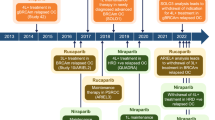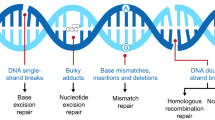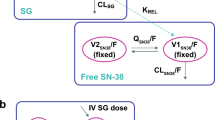Abstract
This phase I/II dose-escalation study evaluated the efficacy, safety, and pharmacokinetics of pilaralisib (SAR245408), a pan-class I phosphoinositide 3-kinase (PI3K) inhibitor, or voxtalisib (SAR245409), a PI3K and mammalian target of rapamycin inhibitor, in combination with letrozole in hormone-receptor-positive (HR+), human epidermal growth factor receptor 2 (HER2)-negative, non-steroidal aromatase inhibitor-refractory, recurrent or metastatic breast cancer. Maximum tolerated doses (MTDs) were determined using a 3 + 3 design in phase I. Efficacy was evaluated at the MTDs in phase II. Twenty-one patients were enrolled in phase I; MTDs were determined to be pilaralisib tablets 400 mg once daily (QD) or voxtalisib capsules 50 mg twice daily in combination with letrozole tablets 2.5 mg QD. Fifty-one patients were enrolled in phase II; one patient had a partial response in the pilaralisib arm. Rates of progression-free survival at 6 months were 17 and 8 % in the pilaralisib and voxtalisib arms, respectively. The most frequently reported treatment-related grade ≥ 3 adverse events were aspartate aminotransferase increased (5 %) and rash (5 %) in the pilaralisib arm, and alanine aminotransferase increased (11 %) and rash (9 %) in the voxtalisib arm. Pilaralisib and voxtalisib did not interact pharmacokinetically with letrozole. Pilaralisib had a greater pharmacodynamic impact than voxtalisib, as demonstrated by its impact on glucose homeostasis. There was no association between molecular alterations in the PI3K pathway and efficacy. In summary, pilaralisib or voxtalisib, in combination with letrozole, was associated with an acceptable safety profile and limited efficacy in endocrine therapy-resistant HR+ , HER2-negative metastatic breast cancer.


Similar content being viewed by others
References
Nadji M, Gomez-Fernandez C, Ganjei-Azar P, Morales AR (2005) Immunohistochemistry of estrogen and progesterone receptors reconsidered: experience with 5993 breast cancers. Am J Clin Pathol 123:21–27
Clemons M, Goss P (2001) Estrogen and the risk of breast cancer. N Engl J Med 344:276–285
Ellis M (2004) Overcoming endocrine therapy resistance by signal transduction inhibition. Oncologist 9(3):20–26
Geisler J, Haynes B, Anker G, Dowsett M, Lonning PE (2002) Influence of letrozole and anastrozole on total body aromatization and plasma estrogen levels in postmenopausal breast cancer patients evaluated in a randomized, cross-over study. J Clin Oncol 20:751–757
Courtney KD, Corcoran RB, Engelman JA (2010) The PI3K pathway as drug target in human cancer. J Clin Oncol 28:1075–1083
Stemke-Hale K, Gonzalez-Angulo AM, Lluch A, Neve RM, Kuo WL, Davies M, Carey M, Hu Z, Guan Y, Sahin A, Symmans WF, Pusztai L, Nolden LK, Horlings H, Berns K, Hung MC, van de Vijver MJ, Valero V, Gray JW, Bernards R, Mills GB, Hennessy BT (2008) An integrative genomic and proteomic analysis of PIK3CA, PTEN, and AKT mutations in breast cancer. Cancer Res 68:6084–6091
The Cancer Genome Atlas Network (2012) Comprehensive molecular portraits of human breast tumours. Nature 490:61–70
Saal LH, Holm K, Maurer M, Memeo L, Su T, Wang X, Yu JS, Malmstrom PO, Mansukhani M, Enoksson J, Hibshoosh H, Borg A, Parsons R (2005) PIK3CA mutations correlate with hormone receptors, node metastasis, and ERBB2, and are mutually exclusive with PTEN loss in human breast carcinoma. Cancer Res 65:2554–2559
Ellis MJ, Ding L, Shen D, Luo J, Suman VJ, Wallis JW, Van Tine BA, Hoog J, Goiffon RJ, Goldstein TC, Ng S, Lin L, Crowder R, Snider J, Ballman K, Weber J, Chen K, Koboldt DC, Kandoth C, Schierding WS, McMichael JF, Miller CA, Lu C, Harris CC, McLellan MD, Wendl MC, DeSchryver K, Allred DC, Esserman L, Unzeitig G, Margenthaler J, Babiera GV, Marcom PK, Guenther JM, Leitch M, Hunt K, Olson J, Tao Y, Maher CA, Fulton LL, Fulton RS, Harrison M, Oberkfell B, Du F, Demeter R, Vickery TL, Elhammali A, Piwnica-Worms H, McDonald S, Watson M, Dooling DJ, Ota D, Chang LW, Bose R, Ley TJ, Piwnica-Worms D, Stuart JM, Wilson RK, Mardis ER (2012) Whole-genome analysis informs breast cancer response to aromatase inhibition. Nature 486:353–360
Prat A, Baselga J (2008) The role of hormonal therapy in the management of hormonal-receptor-positive breast cancer with co-expression of HER2. Nat Clin Pract Oncol 5:531–542
Miller TW, Rexer BN, Garrett JT, Arteaga CL (2011) Mutations in the phosphatidylinositol 3-kinase pathway: role in tumor progression and therapeutic implications in breast cancer. Breast Cancer Res 13:224
Barone I, Cui Y, Herynk MH, Corona-Rodriguez A, Giordano C, Selever J, Beyer A, Ando S, Fuqua SA (2009) Expression of the K303R estrogen receptor-alpha breast cancer mutation induces resistance to an aromatase inhibitor via addiction to the PI3K/Akt kinase pathway. Cancer Res 69:4724–4732
Cavazzoni A, Bonelli MA, Fumarola C, La Monica S, Airoud K, Bertoni R, Alfieri RR, Galetti M, Tramonti S, Galvani E, Harris AL, Martin LA, Andreis D, Bottini A, Generali D, Petronini PG (2012) Overcoming acquired resistance to letrozole by targeting the PI3K/AKT/mTOR pathway in breast cancer cell clones. Cancer Lett 323:77–87
Baselga J, Campone M, Piccart M, Burris HA III, Rugo HS, Sahmoud T, Noguchi S, Gnant M, Pritchard KI, Lebrun F, Beck JT, Ito Y, Yardley D, Deleu I, Perez A, Bachelot T, Vittori L, Xu Z, Mukhopadhyay P, Lebwohl D, Hortobagyi GN (2012) Everolimus in postmenopausal hormone-receptor-positive advanced breast cancer. N Engl J Med 366:520–529
Wolff AC, Lazar AA, Bondarenko I, Garin AM, Brincat S, Chow L, Sun Y, Neskovic-Konstantinovic Z, Guimaraes RC, Fumoleau P, Chan A, Hachemi S, Strahs A, Cincotta M, Berkenblit A, Krygowski M, Kang LL, Moore L, Hayes DF (2013) Randomized phase III placebo-controlled trial of letrozole plus oral temsirolimus as first-line endocrine therapy in postmenopausal women with locally advanced or metastatic breast cancer. J Clin Oncol 31:195–202
Mayer IA, Abramson VG, Isakoff SJ, Forero A, Balko JM, Kuba MG, Sanders ME, Yap JT, Van den Abbeele AD, Li Y, Cantley LC, Winer E, Arteaga CL (2014) Stand up to cancer phase Ib study of pan-phosphoinositide-3-kinase inhibitor buparlisib with letrozole in estrogen receptor-positive/human epidermal growth factor receptor 2-negative metastatic breast cancer. J Clin Oncol 32:1202–1209
Krop I, Johnston S, Mayer IA, Dickler M, Ganju V, Forero-Torres A, Melichar B, Morales S, de Boer R, Gendreau S, Derynck M, Lackner M, Spoerke J, Yeh R-F, Levy G, Ng V, O’Brien C, Savage H, Xiao Y, Wilson T, Lee SC, Petrakova K, Vallentin S, Yardley D, Ellis M, Piccart M, Perez EA, Winer E, Schmid P (2014) The FERGI phase II study of the PI3K inhibitor pictilisib (GDC-0941) plus fulvestrant vs fulvestrant plus placebo in patients with ER+, aromatase inhibitor (AI)-resistant advanced or metastatic breast cancer—part I results. San Antonio Breast Cancer Symposium (SABCS) 2014: abstract S2-02
Piccart M, Hortobagyi GN, Campone M, Pritchard KI, Lebrun F, Ito Y, Noguchi S, Perez A, Rugo HS, Deleu I, Burris HA III, Provencher L, Neven P, Gnant M, Shtivelband M, Wu C, Fan J, Feng W, Taran T, Baselga J (2014) Everolimus plus exemestane for hormone-receptor-positive, human epidermal growth factor receptor-2-negative advanced breast cancer: overall survival results from BOLERO-2. Ann Oncol 25:2357–2362
Shapiro GI, Rodon J, Bedell C, Kwak EL, Baselga J, Brana I, Pandya SS, Scheffold C, Laird AD, Nguyen LT, Xu Y, Egile C, Edelman G (2014) Phase I safety, pharmacokinetic, and pharmacodynamic study of SAR245408 (XL147), an oral pan-class I PI3K inhibitor, in patients with advanced solid tumors. Clin Cancer Res 20:233–245
Soria JC, LoRusso P, Bahleda R, Lager J, Liu L, Jiang J, Martini JF, Mace S, Burris H (2015) Phase I dose-escalation study of pilaralisib (SAR245408, XL147), a pan-class I PI3K inhibitor, in combination with erlotinib in patients with solid tumors. Oncologist 20:245–246
Matulonis U, Vergote I, Backes F, Martin LP, McMeekin S, Birrer M, Campana F, Xu Y, Egile C, Ghamande S (2015) Phase II study of the PI3K inhibitor pilaralisib (SAR245408; XL147) in patients with advanced or recurrent endometrial carcinoma. Gynecol Oncol 136:246–253
Brown JR, Davids MS, Rodon J, Abrisqueta P, Kasar SN, Lager J, Jiang J, Egile C, Awan FT (2015) Phase I trial of the pan-PI3K inhibitor pilaralisib (SAR245408/XL147) in patients with chronic lymphocytic leukemia (CLL) or relapsed/refractory lymphoma. Clin Cancer Res 21:3160–3169
Tolaney S, Burris H, Gartner E, Mayer IA, Saura C, Maurer M, Ciruelos E, Garcia AA, Campana F, Wu B, Xu Y, Jiang J, Winer E, Krop I (2015) Phase I/II study of pilaralisib (SAR245408) in combination with trastuzumab or trastuzumab plus paclitaxel in trastuzumab-refractory HER2-positive metastatic breast cancer. Breast Cancer Res Treat 149:151–161
Papadopoulos K, Tabernero J, Markman B, Patnaik A, Tolcher A, Baselga J, Shi W, Egile C, Ruiz-Soto R, Laird AD, Miles D, Lorusso PM (2014) Phase I safety, pharmacokinetic and pharmacodynamic study of SAR245409 (XL765), a novel, orally administered PI3K/mTOR inhibitor in patients with advanced solid tumors. Clin Cancer Res 20:2445–2456
Wen PY, Omuro A, Ahluwalia MS, Fathallah-Shaykh HM, Mohile N, Lager JJ, Laird AD, Tang J, Jiang J, Egile C, Cloughesy TF (2015) Phase I dose-escalation study of the PI3K/mTOR inhibitor voxtalisib (SAR245409, XL765) plus temozolomide with or without radiotherapy in patients with high-grade glioma. Neuro Oncol. Epub ahead of print
Janne PA, Cohen RB, Laird AD, Mace S, Engelman JA, Ruiz-Soto R, Rockich K, Xu J, Shapiro GI, Martinez P, Felip E (2014) Phase I safety and pharmacokinetic study of the PI3K/mTOR inhibitor SAR245409 (XL765) in combination with erlotinib in patients with advanced solid tumors. J Thorac Oncol 9:316–323
Brown JR, Hamadani M, Arnason J, Karlin L, Hayslip J, Wagner-Johnston N, Cartron G, Ribrag V, de Guibert S, Opat S, Tilly H, Cannell P, Janssens A, Offner F, Ganguly S, Ailawadhi S, Millenson M, Bron D, Xu Y, Ruiz-Soto R, Kersten MJ (2013) SAR245409 monotherapy in relapsed/refractory follicular lymphoma: preliminary results from the phase II ARD12130 study. Blood 122:86
Papadopoulos KP, Egile C, Ruiz-Soto R, Jiang J, Shi W, Bentzien F, Rasco D, Abrisqueta P, Vose JM, Tabernero J (2014) Efficacy, safety, pharmacokinetics and pharmacodynamics of SAR245409 (voxtalisib, XL765), an orally administered phosphoinositide 3-kinase/mammalian target of rapamycin inhibitor: a phase 1 expansion cohort in patients with relapsed or refractory lymphoma. Leuk Lymphoma 56:1763–1770
Eisenhauer EA, Therasse P, Bogaerts J, Schwartz LH, Sargent D, Ford R, Dancey J, Arbuck S, Gwyther S, Mooney M, Rubinstein L, Shankar L, Dodd L, Kaplan R, Lacombe D, Verweij J (2009) New response evaluation criteria in solid tumours: revised RECIST guideline (version 1.1). Eur J Cancer 45:228–247
National Cancer Institute. Common Terminology Criteria for Adverse Events (CTCAE) version 3.0. 2006. http://ctep.cancer.gov/protocoldevelopment/electronic_applications/docs/ctcaev3.pdf
Awada A, Cardoso F, Fontaine C, Dirix L, De Greve J, Sotiriou C, Steinseifer J, Wouters C, Tanaka C, Zoellner U, Tang P, Piccart M (2008) The oral mTOR inhibitor RAD001 (everolimus) in combination with letrozole in patients with advanced breast cancer: results of a phase I study with pharmacokinetics. Eur J Cancer 44:84–91
Stephens PJ, Tarpey PS, Davies H, Van Loo P, Greenman C, Wedge DC, Nik-Zainal S, Martin S, Varela I, Bignell GR, Yates LR, Papaemmanuil E, Beare D, Butler A, Cheverton A, Gamble J, Hinton J, Jia M, Jayakumar A, Jones D, Latimer C, Lau KW, McLaren S, McBride DJ, Menzies A, Mudie L, Raine K, Rad R, Chapman MS, Teague J, Easton D, Langerod A, Lee MT, Shen CY, Tee BT, Huimin BW, Broeks A, Vargas AC, Turashvili G, Martens J, Fatima A, Miron P, Chin SF, Thomas G, Boyault S, Mariani O, Lakhani SR, van d, V, van ‘, V, Foekens J, Desmedt C, Sotiriou C, Tutt A, Caldas C, Reis-Filho JS, Aparicio SA, Salomon AV, Borresen-Dale AL, Richardson AL, Campbell PJ, Futreal PA, Stratton MR (2012) The landscape of cancer genes and mutational processes in breast cancer. Nature 486:400–404
Brown JR, Davids MS, Rodon J, Abrisqueta P, Egile C, Ruiz-Soto R, Awan F (2013) Update on the safety and efficacy of the pan class I PI3K inhibitor SAR245408 (XL147) in chronic lymphocytic leukemia and non-Hodgkin’s lymphoma patients. Blood 122:4170
Saura C, Bendell J, Jerusalem G, Su S, Ru Q, De Buck S, Mills D, Ruquet S, Bosch A, Urruticoechea A, Beck JT, Di Tomaso E, Sternberg DW, Massacesi C, Hirawat S, Dirix L, Baselga J (2014) Phase Ib study of buparlisib plus trastuzumab in patients with HER2-positive advanced or metastatic breast cancer that has progressed on trastuzumab-based therapy. Clin Cancer Res 20:1935–1945
Bendell C, Rodon J, Burris HA, de Jonge M, Verweij J, Birle D, Demanse D, De Buck SS, Ru QC, Peters M, Goldbrunner M, Baselga J (2012) Phase I, dose-escalation study of BKM120, an oral pan-Class I PI3K inhibitor, in patients with advanced solid tumors. J Clin Oncol 30:282–290
Markman B, Tabernero J, Krop I, Shapiro GI, Siu L, Chen LC, Mita M, Melendez CM, Stutvoet S, Birle D, Anak O, Hackl W, Baselga J (2012) Phase I safety, pharmacokinetic, and pharmacodynamic study of the oral phosphatidylinositol-3-kinase and mTOR inhibitor BGT226 in patients with advanced solid tumors. Ann Oncol 23:2399–2408
Rodon J, Brana I, Siu LL, De Jonge MJ, Homji N, Mills D, Di Tomaso E, Sarr C, Trandafir L, Massacesi C, Eskens F, Bendell JC (2014) Phase I dose-escalation and -expansion study of buparlisib (BKM120), an oral pan-Class I PI3K inhibitor, in patients with advanced solid tumors. Invest New Drugs 32:670–681
Acknowledgments
This study was funded by Sanofi. The authors received editorial support from Simone Blagg of MediTech Media, funded by Sanofi.
Author information
Authors and Affiliations
Corresponding author
Ethics declarations
Conflict of interest
Frank Campana, Lei Gao, Jason Jiang, and Sandrine Macé are employees of Sanofi. Jason Jiang has stock ownership in Sanofi. Sara Tolaney has received research funding from Genentech. The other authors have no conflicts to declare.
Ethical declaration
These experiments comply with the current laws of the countries in which they were performed.
Electronic supplementary material
Below is the link to the electronic supplementary material.
10549_2015_3615_MOESM1_ESM.pdf
Supplementary Fig. S1 Mutational profiling in tumor samples from patients enrolled in phase I and phase II. Each of the 67 cancer genes in which a somatic mutation or copy number change has been identified is listed. The number of mutations in each gene (rows) and in each of 38 tumor samples (columns) is shown (PDF 442 kb)
10549_2015_3615_MOESM2_ESM.pdf
Supplementary Fig. S2. C-peptide levels over time with (a) pilaralisib 200 mg, (b) pilaralisib 400 mg, (c) voxtalisib 30 mg or (d) voxtalisib 50 mg in samples from patients enrolled in phase I and phase II. Each line represents a single patient. Samples were analyzed before drug dosing on days 1, 29 (week 5), 57 (week 9) and 85. Lower (0.27) and upper (1.28) normal limits for C-peptide levels are indicated (PDF 911 kb)
10549_2015_3615_MOESM3_ESM.pdf
Supplementary Fig. S3 Percentage change in C-peptide in patients treated with (a) pilaralisib 400 mg QD or (b) voxtalisib 50 mg BID in samples from patients enrolled in phase I and phase II. Serum samples were analyzed at baseline and before drug dosing on days 1, 29 (week 5), 57 (week 9) and 85. Boxes represent interquartile ranges, diamonds represent means, and horizontal bars represent median, Q25 and Q75 (PDF 899 kb)
Rights and permissions
About this article
Cite this article
Blackwell, K., Burris, H., Gomez, P. et al. Phase I/II dose-escalation study of PI3K inhibitors pilaralisib or voxtalisib in combination with letrozole in patients with hormone-receptor-positive and HER2-negative metastatic breast cancer refractory to a non-steroidal aromatase inhibitor. Breast Cancer Res Treat 154, 287–297 (2015). https://doi.org/10.1007/s10549-015-3615-9
Received:
Accepted:
Published:
Issue Date:
DOI: https://doi.org/10.1007/s10549-015-3615-9




